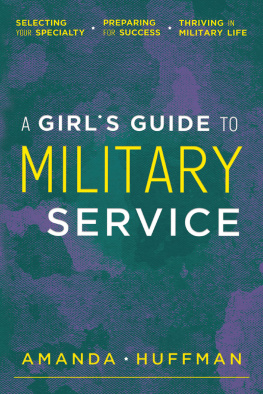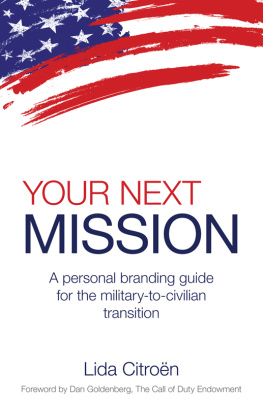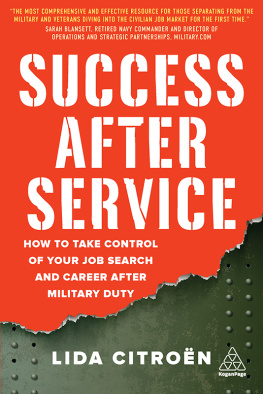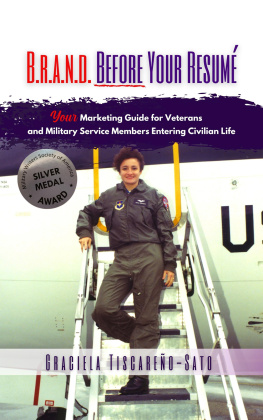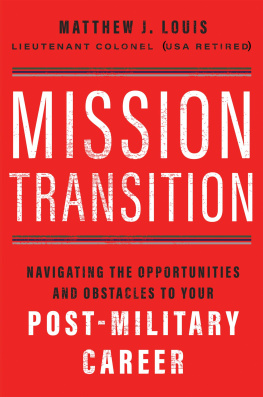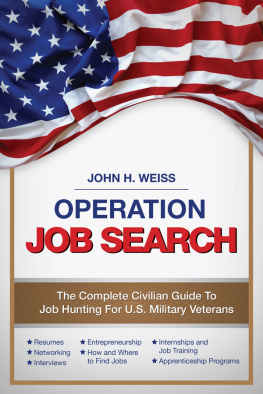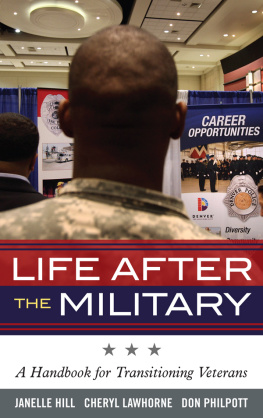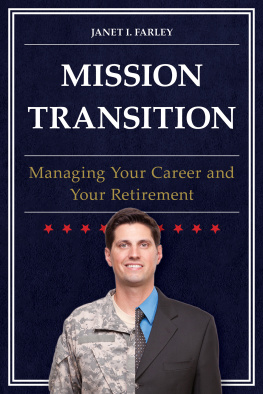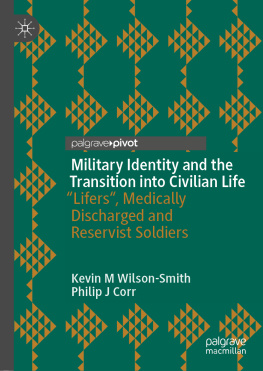OUT OF UNIFORM
RELATED POTOMAC TITLES
Assignment: Pentagon
How to Excel in a Bureaucracy
by Maj. Gen. Perry M. Smith USAF (Ret.)
The Veterans Survival Guide:
How to File and Collect on VA Claims, 2nd ed.,
by John D. Roche
OUT OF UNIFORM
YOUR GUIDE TO A SUCCESSFUL MILITARY-TO-CIVILIAN CAREER TRANSITION
TOM WOLFE

Copyright 2012 by Potomac Books, Inc.
Published in the United States by Potomac Books, Inc. All rights reserved. No part of this book may be reproduced in any manner whatsoever without written permission from the publisher, except in the case of brief quotations embodied in critical articles and reviews.
Library of Congress Cataloging-in-Publication Data
Wolfe, Tom, 1950
Out of uniform : your guide to a successful military-to-civilian career transition / Tom Wolfe. 1st ed.
p. cm.
Includes index.
ISBN 978-1-59797-715-9 (paperback)
ISBN 978-1-59797-720-3 (electronic edition)
1. Career changesUnited States. 2. Retired military personnelEmploymentUnited States. 3. VeteransEmploymentUnited States. 4. Job huntingUnited States. 5. Vocational guidance. I. Title.
HF5384.W64 2011
650.14086970973dc23
2011024809
Printed in the United States of America on acid-free paper that meets the American National Standards Institute Z39-48 Standard.
Potomac Books
22841 Quicksilver Drive
Dulles, Virginia 20166
First Edition
10 9 8 7 6 5 4 3 2 1
To my mom
a lifelong educator and lover of books,
for her encouragement and support.
To my dad
a veteran of Omaha Beach, Normandy, and Orange Beach, Okinawa, whose service both in and out of uniform has been an inspiration.
CONTENTS
PREFACE
My first civilian career lasted four weeks. I was just about to start week five when the president of the company called me to his office to tell me that I was not a good match for the job. He explained that although I had done nothing wrong, he was letting me go.
Dazed and confused, I found my way to my car. My wife had yet to make the move from Virginia Beach so I packed up what few things I had with me and headed home. That five-hour drive gave me plenty of time to think. My emotions were all over the placeshock, disbelief, anger, embarrassment, sadness, fear, and uncertainty. However, by the time I pulled into my driveway, what I was mostly feeling was relief.
I had not been happy in that job, something I sensed during my second week. I had very little interest in the companys products, and I had very little in common with the people who worked there. In fact, I was the first veteran they had ever hired. So, why in the world did I accept the offer in the first place?
For all the wrong reasons, of course, but how was I to know that at the time? I was twenty-seven years old, and the last time I had a civilian job was when I was a plumbers helper at the age of sixteen. Since then the navy had eliminated any need for a rsum, a suit, or an interview. I was a successful, confident naval officer and I felt bulletproof. In reality, I was a babe in the woods. I took that offer because of the title (southeast regional sales manager) and the money. Big mistake.
Being fired was a humbling experience, but I landed on my feet. I knew I needed help, so I checked out several of the military-to-civilian placement firms. One stood out from the rest. In addition to a notable list of client companies, the people who worked there were impressive, and most of them were veterans. They took an interest in me as a person and did their best to help me find the right job. After a dozen interviews and multiple offers, the placement company asked me to work for them, and I accepted their offer. Fortunately I got it right the second time around. I made partner and retired from that company thirty years later.
During those thirty years I assisted thousands of service men and women as they transitioned from the military to civilian employment. In addition to providing technical guidance (on rsums, wardrobe selection, and interview skills), I made it my mission to help every one of them avoid the mistakes I had made. I emphasized the importance of identifying what really matters to them and taking the time to develop an awareness of personal strengths and motivators. A frequent reaction to my guidance and counseling was encouragement to write a book, to which I would respond by saying, Someday.
Someday is now. The standard advice for aspiring writers is to write what you know. Having dedicated my professional life to assisting those in military-to-civilian career transition, that is what I know. I wrote this book in order to share this information and lessons learned with current and future veterans.
INTRODUCTION
More than 200,000 military personnel transitioned to civilian status last year. Millions more made that journey before them. About 200,000 or more will do so this year. All of them share a single common denominator: wearing the uniform in the service of our country. Almost all of them share a second common denominator: when they leave the military, they look for civilian employment.
How about you? Why are you reading this book? Let me guess. You are in transition from a military to a civilian career and you are thinking:
I want a fast-paced career with a growing, dynamic company where compensation is aligned with work ethic and results, where the environment and people are positive and supportive, and where there is an opportunity for rapid professional growth commensurate with proven performance.
Or maybe:
I want a nice house in a safe, quiet neighborhood with access to good schools, and a personal life that allows me to spend time with my family, play golf, coach Little League, and get involved in community service activities.
Or perhaps:
I want a career opportunity that allows me to balance the requirements of my personal and professional lives.
Or simply:
I need a job.
No matter what your goals or aspirations may be, I am here to help. I am a veteran, and I know what it is like to get out and look for a job. For over thirty years I have had the privilege of guiding thousands of men and women as they transitioned from military to civilian occupations. I am very familiar with that process and fortunate to have worked with many professionals and subject matter experts over the years.
This guide will help military personnel as they prepare for and adjust to civilian employment, regardless of service, branch, rank, rating, time in service, or specialty. Although all of you share the common denominators mentioned earlier, each of you brings something unique to the job market, and each of you wants something different from a job search.
While those differences make a one-size-fits-all guide impossible, you can tailor the use of the material to suit your needs. Some of you will absorb the information cover to cover, while others will use the table of contents or keyword index to focus on exactly the information and guidance needed at the moment. Throughout this book you will encounter the words tool, tools, and toolbox many times. Keep track of them. Not only will you use them throughout your job search and interviews, but you will also carry them with you as your career continues to develop.
You will also notice that I use the names of companies and individuals throughout the book. The company names spelled in all capital letters and italicized (
Next page







